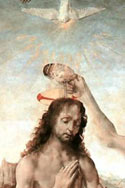
Much attention has been given to The Da Vinci Code’s claim that Jesus was married to Mary Magdalene. But an even more audacious claim of the novel is that the divinity of Jesus was first raised and established at the Council of Nicaea in A.D. 325, and that prior to that time, no one—not even Jesus’ followers—believed Jesus was anything more than a “mortal prophet” and great man. The fact that this has caused hardly a ripple among fans of the novel indicates a revealing (and hardly surprising) lack of knowledge about early Church history and belief.
There is plenty of evidence that the early Christians, dating back to Jesus’ time on earth, believed that Jesus of Nazareth was divine. In his seminal study, Early Christian Doctrines, noted scholar J.N.D. Kelly writes that “the all but universal Christian conviction in the [centuries prior to the Council of Nicaea] had been that Jesus Christ was divine as well as human. The most primitive confession had been ‘Jesus is Lord’ [Rom 10:9; Phil 2:11], and its import had been elaborated and deepened in the apostolic age.”
The Council of Nicaea did not define that Jesus, the Son of God, was divine (since that was accepted by all Christians) but addressed the issue of the exact relationship between the Son and the Father: Are they equal? One in substance? Two Persons? The Council specifically addressed and condemned the popular heresy of that time, called Arianism, which insisted that the Son was a lesser god, created by the Father at some point in time and not eternally exi
No comments:
Post a Comment